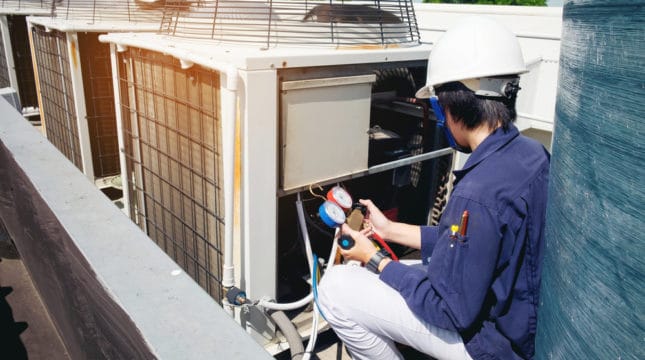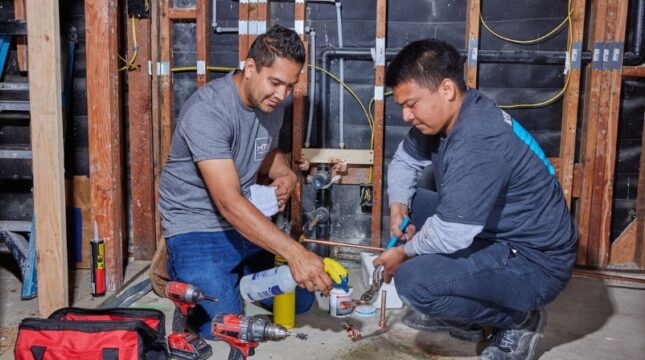1. HVAC licenses, certifications and permits
The first step is to look into state licensing requirements for HVAC (there aren’t any federal requirements for an HVAC license or certification). State certifications vary depending on where you live and the services you offer. Proper licensing ensures compliance with regulations — and it can boost confidence in potential clients.
Training and education
A training program at an accredited school can kickstart your career. It usually takes about six months to two years depending on the program.
New HVAC technicians typically begin their journey working with more experienced professionals. The hands-on experience can either be through an informal program or as part of an apprenticeship. The learning usually lasts three to five years, according to the Bureau of Labor Statistics.
Your first few tasks might be basic, such as insulating refrigerant lines or cleaning furnaces. But as you gain experience with safety practices, blueprint reading and handling tools, you can take on more complex assignments like cutting and soldering pipes or troubleshooting electrical circuits.
State licensing requirements for HVAC
Depending on your location and the scope of your services, HVAC state licensing and certification can vary. You may need to:
- Pass an exam
- Show proof of insurance
- Have relevant experience
- Take a certification training program
If you plan to work on equipment with refrigerants, you must also get EPA certification under section 608. If you’re starting an HVAC company, it is a good idea to get Universal certification, the highest certification possible, for servicing all types of HVAC equipment.
Learn more about HVAC licenses by state.
Local business licenses and permits
To run your HVAC company as a business, you must also follow state and city guidelines that apply to all small businesses. You’ll probably need a business license and a permit to start operations in a commercial space. Visit your state or city chamber of commerce to learn more.
2. Small business structure and taxation
Once you and your business are certified, you’ll need to determine a legal structure for your business. You could be a self-employed sole proprietor, an owner of a limited liability company (LLC) or something else. The structure you choose for your business has implications for how the IRS taxes your operation.
The IRS has a detailed guide of what each business structure means for your taxes. It covers sole proprietorships, LLCs, corporations and partnerships. If you’re starting your own HVAC business, you may want to know a little bit about all of these options.
Businesses are automatically classified as a sole proprietor unless they formally create another business structure, according to the Small Business Administration. A more formal structure can separate your personal assets and liabilities from your business assets and liabilities. With an LLC, your personal assets are somewhat protected from liability, but the IRS considers you to be self-employed and requires you to pay self-employment taxes.
Reach out to an attorney or a tax accountant to help you understand the implications and choose the right setup for your business.
3. Insurance coverage for your HVAC business
Insurance coverage is essential for your small business. You need it to protect yourself, your business assets and employees from accidents, injuries, legal liability or any number of things that could go wrong. The right coverage can shield you financially so you don’t bear the burden of expenses out of pocket.
HVAC insurance can help you tailor coverage to develop the right policy for your business. Types of coverage to consider include:
General liability insurance
General liability insurance can help protect your HVAC business from third-party claims for:
- Bodily injury
- Property damage
- Advertising injuries like stolen ideas, slander, and copyright infringement
A policy can help cover legal fees, medical expenses and settlement costs if a customer slips and falls at your business or if a job damages a customer’s property.
Workers’ compensation insurance
If you have employees, workers’ compensation insurance is usually mandatory in most states. It helps protect employees and safeguards your business from potential lawsuits related to workplace injuries. The insurance company can help cover the bill for medical expenses, lost wages and rehabilitation costs for work-related injuries or illnesses.
Commercial property insurance
Insurance for commercial property helps protect your HVAC business equipment, inventory and building whether you own or lease your space. A typical policy can cover the physical structure and the contents inside from fire, theft, vandalism and some natural disasters.
Professional liability insurance
Also known as errors and omissions insurance (E&O), professional liability insurance protects you if your business makes an error or mistake on the job. For example, if a customer says your HVAC installation caused an air quality issue or property damage, professional liability coverage can help pay for legal defense costs and settlements.
Commercial auto insurance
Commercial auto insurance is crucial if your HVAC business uses vehicles for work-related driving, such as service vans or trucks. Personal auto insurance won’t kick in if you use your car for your business. Many states require commercial auto insurance for business-owned vehicles to help cover medical bills and property damage.
Tools & equipment insurance
Tools and equipment for your HVAC business aren’t cheap. Tools and equipment insurance helps protect your gear against damage or theft in your vehicle, your trailer or on a job site.
4. HVAC business plan and marketing strategy
With your licensing and insurance in gear, it’s time to lay the groundwork for the business. A business plan and a solid marketing strategy can help you chart a path.
Map your journey with a business plan
Start by laying out your HVAC business startup costs. One-time or ongoing expenses may include:
- HVAC tools and equipment
- Commercial rent
- Vehicle costs
- Insurance costs
- Office equipment, software and accounting
- Marketing collateral, such as signs, banners, business cards and website
After you have a sense of costs, start a business plan for the first five years of your business. Project how much money you expect to make and on what timeline, and how much you can expect to spend. The U.S. Small Business Administration has a helpful guide (and template) to walk you through writing a business plan.
Get the word out with HVAC marketing
Letting people know you’re ready to work is crucial to establishing your presence and attracting customers.
Most small business owners gain their initial traction through word-of-mouth marketing. Ask your first clients to review your services online and to tell their friends about you. Positive reviews and personal recommendations can significantly boost your credibility and help you get new customers.
For HVAC professionals, the Small Business Administration’s marketing materials help you highlight your business’s competitive advantages and help you promote your work to clients in need.






